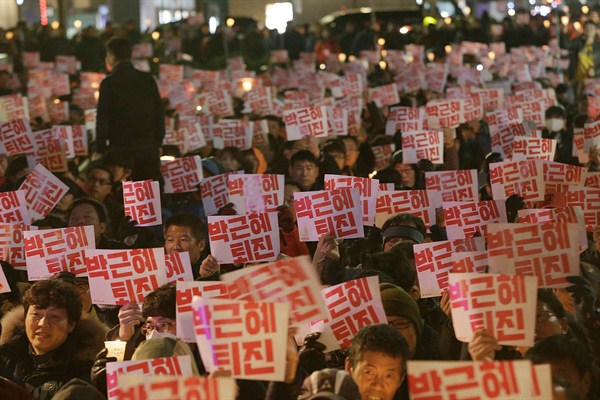“I will repay the hopes and prayers you’ve placed in each and every lucky bag,” Park Geun-hye promised a quiet crowd in Seoul on a February morning in 2013. South Korea’s newly elected first female president was referring to the bokjumeoni—colorful silk pouches thought to bring good luck, South Korea’s version of a four-leaf clover—that decorated the tree behind her in Gwanghwamun Square. Some of the pouches were embroidered with the Chinese characters for “fortune” or “wealth,” while others had images of animals on them. When the inaugural ceremony began, the tree was wrapped in a giant bokjumeoni that opened like a blossom when Park pulled a string. It was all very elaborate, but Park’s meaning was plain: I will answer your prayers.
Earlier in the day, she had dappled her inaugural address to the country before the National Assembly building with semi-religious language, speaking of the “Miracle on the Han,” her “faith in the Korean people,” and her desire to revive the nation’s “spirit,” which she described as a sense of community and consideration for others. South Koreans call this “jeong,” and many of them consider it their culture’s defining trait, though its sundry connotations make it virtually untranslatable. Looking out at the crowd and cameras, Park honed in on one, and reminded her fellow citizens, “Even in their hardship, our ancestors had the generosity of mind to put aside a few persimmons for the magpies during the harvest season.”
That was three years ago. Her approval rating surged to almost 70 percent before the year was out, and for a moment the hope of a more united nation felt real. But after the sinking of the Sewol ferry in 2014, which some have called the country’s 9/11, her approval rating fell to 40 percent. After the MERS outbreak in 2015, it slipped below 30 percent. And after the scandal that has engulfed her administration, involving Park’s friend and informal adviser, Choi Soon-sil, broke in late October, it collapsed to 5 percent. Among people under 30, Park now has zero support.

